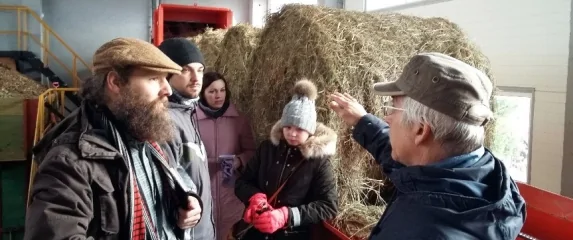Baltic Peatland Farmers Capturing Carbon
Enabling farmers and land-users in the Baltic countries to implement “paludiculture”: wet and carbon-neutral peatland farming.
Agriculture Carbon Removals and Sinks Peatlands

Project info
Estonia, Germany, Latvia, Lithuania
08/21 - 06/24
Private sector, Associations, National governments, EU institutions
612,955.58 €
Contact info
Andreas Haberl
- Estonian Fund for Nature (ELF)
- Foundation for Peatlands Restoration and Conservation Lithuania (FPRC)
- Lake and Peatland Research Centre Latvia (L&PRC)
Background
Baltic countries are rich in peatlands. Conventional agriculture drains and degrades peatlands and turns them into constant CO2 sources that boost climate change. Peatland rewetting and wet management stops emissions and enables paludiculture, the carbon-neutral agricultural use of peatland. Large-scale implementation of peatland rewetting and paludiculture in the Baltics could reduce CO2 emissions by five to ten megatonnes annually. To implement wet peatland management, farmers need support and training, as practical experience is a key prerequisite besides enabling climate and agricultural policies.
Project
The project team conducts several activities which all aim to increase the application of paludiculture in the Baltics, thus contributing significantly to the reduction of CO2 emissions in the region.
The team cooperates with agricultural advisory services in Estonia, Latvia and Lithuania. With them, it conducts “training for trainers” events, where they share knowledge on climate-friendly peatland management. In turn, representatives of the advisory services consult the project members on designing the training programme “Paludiculture & Carbon Farmers”. After completing the “training for trainers”, the participants consult interested Baltic land users on the potential of paludiculture.
Additionally, the project team aims to raise public awareness of the approach. Therefore, it informs rural communities on the many applications and the broad variety of climate and environmentally friendly paludiculture products. This happens through mobile paludiculture exhibitions along roads leading to fairs, festivals, and markets. Furthermore, online promotional videos aim at a wider target audience.
In parallel, the project builds on a previously initiated Baltic paludiculture dialogue which connects representatives from various groups such as farmers, ministers, and teams from paludiculture pilot projects. They are invited to share their practical experience in a Pan-Baltic paludiculture and carbon farming network. Network representatives approach policy makers on Baltic and EU level with concise proposals on policy adaptation, aiming for climate and agricultural policies that support future paludiculture farmers. If policy frameworks allow to implement wet peatland management on a profitable basis, land users are expected to be more likely to consider this approach.
Last update: July 2024
